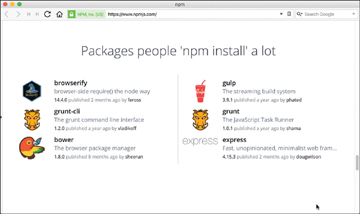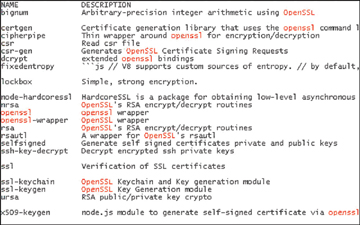- Understanding Node.js
- Installing Node.js
- Working with Node Packages
- Creating a Node.js Application
- Writing Data to the Console
- Summary
- Next
Working with Node Packages
One of the most powerful features of the Node.js framework is the ability to easily extend it with additional Node Packaged Modules (NPMs) using the Node Package Manager (NPM). That’s right, in the Node.js world, NPM stands for two things. This book refers to the Node Packaged Modules as modules to make it easier to follow.
What Are Node Packaged Modules?
A Node Packaged Module is a packaged library that can easily be shared, reused, and installed in different projects. Many different modules are available for a variety of purposes. For example, the Mongoose module provides an ODM (Operational Data Model) for MongoDB, Express extends Node’s HTTP capabilities, and so on.
Node.js modules are created by various third-party organizations to provide the needed features that Node.js lacks out of the box. This community of contributors is active in adding and updating modules.
Node Packaged Modules include a package.json file that defines the packages. The package.json file includes informational metadata, such as the name, version author, and contributors, as well as control metadata, such as dependencies and other requirements that the Node Package Manager uses when performing actions such as installation and publishing.
Understanding the Node Package Registry
The Node modules have a managed location called the Node Package Registry where packages are registered. This allows you to publish your own packages in a location where others can use them as well as download packages that others have created.
The Node Package Registry is located at https://npmjs.com. From this location you can view the newest and most popular modules as well as search for specific packages, as shown in Figure 3.1.

Figure 3.1 The official Node Package Modules website
Using the Node Package Manager
The Node Package Manager you have already seen is a command-line utility. It allows you to find, install, remove, publish, and do everything else related to Node Package Modules. The Node Package Manager provides the link between the Node Package Registry and your development environment.
The simplest way to really explain the Node Package Manager is to list some of the command-line options and what they do. You use many of these options in the rest of this chapter and throughout the book. Table 3.1 lists the Node Package Manager commands.
Table 3.1 npm command-line options (with express as the package, where appropriate)
| Option | Description | Example |
| search | Finds module packages in the repository | npm search express |
| install | Installs a package either using a package.json file, from the repository, or a local location | npm install npm install express npm install express@0.1.1 npm install ../tModule.tgz |
| install –g | Installs a package globally | npm install express -g |
| remove | Removes a module | npm remove express |
| pack | Packages the module defined by the package.json file into a .tgz file | npm pack |
| view | Displays module details | npm view express |
| publish | Publishes the module defined by a package.json file to the registry | npm publish |
| unpublish | Unpublishes a module you have published | npm unpublish myModule |
| owner | Allows you to add, remove, and list owners of a package in the repository | npm add bdayley myModule npm rm bdayley myModule npm ls myModule |
Searching for Node Package Modules
You can also search for modules in the Node Package Registry directly from the command prompt using the npm search <search_string> command. For example, the following command searches for modules related to openssl and displays the results as shown in Figure 3.2:
npm search openssl

Figure 3.2 Searching for Node.js modules from the command prompt
Installing Node Packaged Modules
To use a Node module in your applications, it must first be installed where Node can find it. To install a Node module, use the npm install <module_name> command. This downloads the Node module to your development environment and places it into the node_modules folder where the install command is run. For example, the following command installs the express module:
npm install express
The output of the npm install command displays the dependency hierarchy installed with the module. For example, the following code block shows part of the output from installing the express module.
C:\express\example `-- express@4.14.0 +-- accepts@1.3.3 | +-- mime-types@2.1.11 | | `-- mime-db@1.23.0 | `-- negotiator@0.6.1 +-- array-flatten@1.1.1 +-- content-disposition@0.5.1 +-- content-type@1.0.2 +-- cookie@0.3.1 +-- cookie-signature@1.0.6 +-- debug@2.2.0 | `-- ms@0.7.1 ...
The dependency hierarchy is listed; some of the methods Express requires are cookie-signature, range-parser, debug, fresh, cookie, and send modules. Each of these was downloaded during the install. Notice that the version of each dependency module is listed.
Node.js has to be able to handle dependency conflicts. For example, the express module requires cookie 0.3.1, but another module may require cookie 0.3.0. To handle this situation, a separate copy for the cookie module is placed in each module’s folder under another node_modules folder.
To illustrate how modules are stored in a hierarchy, consider the following example of how express looks on disk. Notice that the cookie and send modules are located under the express module hierarchy, and that since the send module requires mime it is located under the send hierarchy:
./ ./node_modules ./node_modules/express ./node_modules/express/node_modules/cookie ./node_modules/express/node_modules/send ./node_modules/express/node_modules/send/node_modules/mime
Using package.json
All Node modules must include a package.json file in their root directory. The package.json file is a simple JSON text file that defines the module including dependencies. The package.json file can contain a number of different directives to tell the Node Package Manager how to handle the module.
The following is an example of a package.json file with a name, version, description, and dependencies:
{
"name": "my_module",
"version": "0.1.0",
"description": "a simple node.js module",
"dependencies" : {
"express" : "latest"
}
}
The only required directives in the package.json file are name and version. The rest depend on what you want to include. Table 3.2 describes the most common directives:
Table 3.2 Directives used in the package.json file
| Directive | Description | Example |
| name | Unique name of package. | "name": "camelot" |
| preferGlobal | Indicates this module prefers to be installed globally. | "preferGlobal": true |
| version | Version of the module. | "version": 0.0.1 |
| author | Author of the project. | "author": "arthur@???.com" |
| description | Textual description of module. | "description": "a silly place" |
| contributors | Additional contributors to the module. | "contributors": [
{ "name": "gwen",
"email": "gwen@???.com"}] |
| bin | Binary to be installed globally with project. | "bin: {
"excalibur":
"./bin/excalibur"} |
| scripts | Specifies parameters that execute console apps when launching node. | "scripts" {
"start": "node ./bin/
excalibur",
"test": "echo testing"} |
| main | Specifies the main entry point for the app. This can be a binary or a .js file. | "main": "./bin/excalibur" |
| repository | Specifies the repository type and location of the package. | "repository": {
"type": "git",
"location":
"http://???.com/c.git"} |
| keywords | Specifies keywords that show up in the npm search. | "keywords": [ "swallow", "unladen" ] |
| dependencies | Modules and versions this module depends on. You can use the * and x wildcards. | "dependencies": {
"express": "latest",
"connect": "2.x.x,
"cookies": "*" } |
| engines | Version of node this package works with. | "engines": {
"node": ">=6.5"} |
A great way to use package.json files is to automatically download and install the dependencies for your Node.js app. All you need to do is create a package.json file in the root of your project code and add the necessary dependencies to it. For example, the following package.json requires the express module as a dependency.
{
"name": "my_module",
"version": "0.1.0",
"dependencies" : {
"express" : "latest"
}
}
Then you run the following command from root of your package, and the express module is automatically installed.
npm install
Notice that no module is specified in the npm install. That is because npm looks for a package.json file by default. Later, as you need additional modules, all you need to do is add those to the dependencies directive and then run npm install again.
